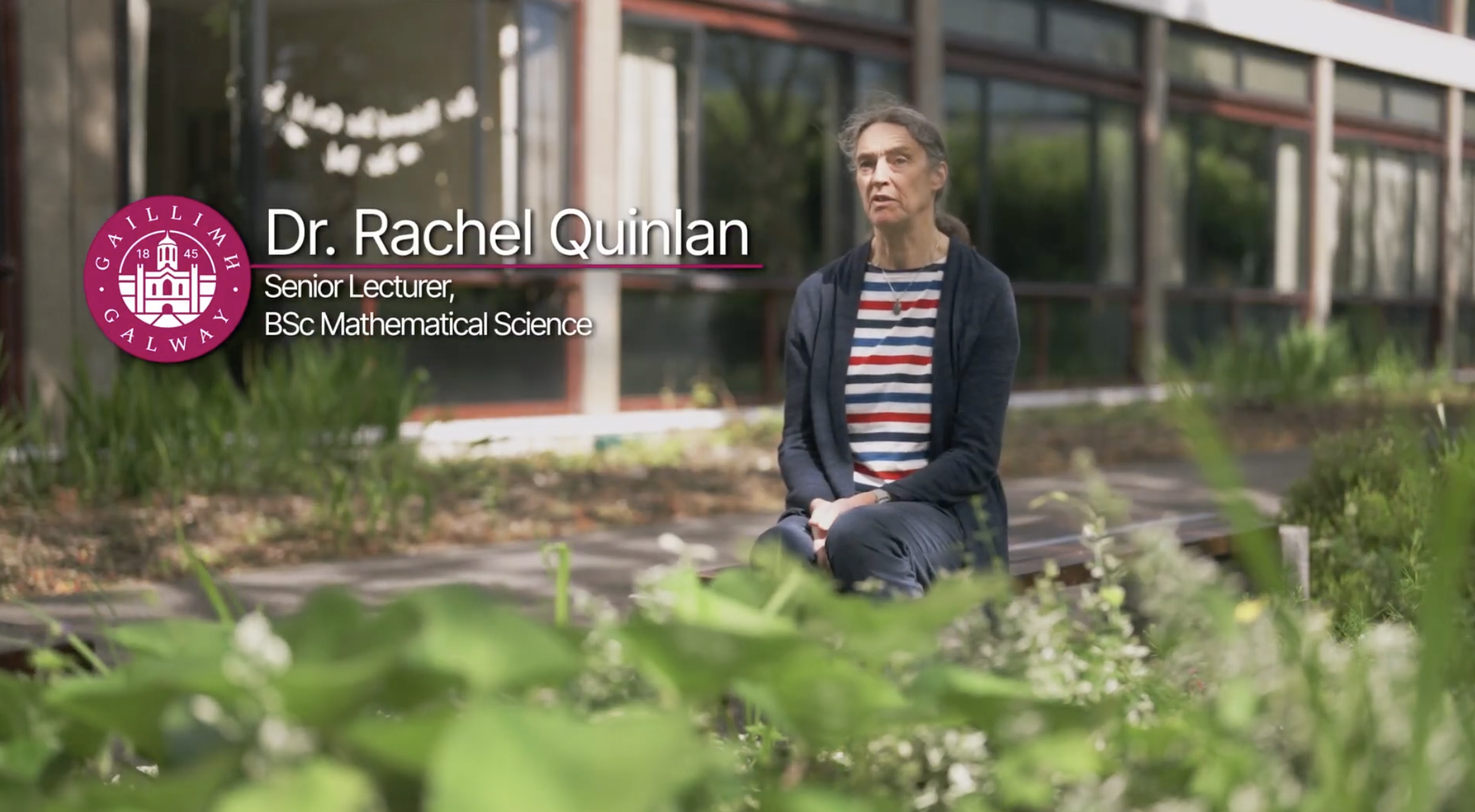-
Courses

Courses
Choosing a course is one of the most important decisions you'll ever make! View our courses and see what our students and lecturers have to say about the courses you are interested in at the links below.
-
University Life

University Life
Each year more than 4,000 choose University of Galway as their University of choice. Find out what life at University of Galway is all about here.
-
About University of Galway

About University of Galway
Since 1845, University of Galway has been sharing the highest quality teaching and research with Ireland and the world. Find out what makes our University so special – from our distinguished history to the latest news and campus developments.
-
Colleges & Schools

Colleges & Schools
University of Galway has earned international recognition as a research-led university with a commitment to top quality teaching across a range of key areas of expertise.
-
Research & Innovation

Research & Innovation
University of Galway’s vibrant research community take on some of the most pressing challenges of our times.
-
Business & Industry

Guiding Breakthrough Research at University of Galway
We explore and facilitate commercial opportunities for the research community at University of Galway, as well as facilitating industry partnership.
-
Alumni & Friends

Alumni & Friends
There are 128,000 University of Galway alumni worldwide. Stay connected to your alumni community! Join our social networks and update your details online.
-
Community Engagement

Community Engagement
At University of Galway, we believe that the best learning takes place when you apply what you learn in a real world context. That's why many of our courses include work placements or community projects.
Bachelor of Science (Mathematical Science)
Course Overview
This honours degree programme provides students with a solid foundation in Mathematical Science, encompassing all aspects of mathematics and its applications. Students will have the opportunity to specialise in particular areas, for example in mathematics, applied mathematics, financial mathematics, computer science, statistics and bioinformatics.
Applications and Selections
Who Teaches this Course
Requirements and Assessment
Key Facts
Entry Requirements
Minimum Grade H5 in two subjects and passes in four other subjects at O6/H7 level in the Leaving Certificate including Irish, English, Mathematics and three other subjects recognised for entry purposes. Additional requirements: Minimum of H5 or O1 in Mathematics.
Additional Requirements
Recognition of Prior Learning (RPL)
Duration
4 years
Next start date
September 2025
A Level Grades (2024)
universityofgalway.ie/alevels
Average intake
15
QQI/FET FETAC Entry Routes
Closing Date
NFQ level
Mode of study
ECTS weighting
Award
CAO
GY319
Course code
Course Outline
YEAR ONE
• Applied Mathematics
• Mathematics
• Probability Models and Statistical Methods
• Introduction to Programming
• One of: Biology, Chemistry, Physics
• Mathematical Science Workshop Series
YEAR TWO
Curriculum core consists of components from the following modules/pathways:
• Linear Algebra
• Discrete Mathematics
• Differential Forms
• Complex Analysis
• Probability
• Statistical Inference
• Mechanics
• Mathematical Methods
• Up to one-third of the second-year curriculum can be selected from a list of additional options, some offered from within the school and some available within other science disciplines, subject by first-year prerequisites
YEAR THREE AND FOUR
• Selection of specialised modules from chosen areas of the mathematical sciences. Students can view the range of possibilites on the course website.
• Final-year project in subject area of your choice.
See course outline for GY319 Mathematical Science here
Curriculum Information
Curriculum information relates to the current academic year (in most cases).Course and module offerings and details may be subject to change.
Glossary of Terms
- Credits
- You must earn a defined number of credits (aka ECTS) to complete each year of your course. You do this by taking all of its required modules as well as the correct number of optional modules to obtain that year's total number of credits.
- Module
- An examinable portion of a subject or course, for which you attend lectures and/or tutorials and carry out assignments. E.g. Algebra and Calculus could be modules within the subject Mathematics. Each module has a unique module code eg. MA140.
- Subject
- Some courses allow you to choose subjects, where related modules are grouped together. Subjects have their own required number of credits, so you must take all that subject's required modules and may also need to obtain the remainder of the subject's total credits by choosing from its available optional modules.
- Optional
- A module you may choose to study.
- Required
- A module that you must study if you choose this course (or subject).
- Required Core Subject
- A subject you must study because it's integral to that course.
- Semester
- Most courses have 2 semesters (aka terms) per year, so a three-year course will have six semesters in total. For clarity, this page will refer to the first semester of year 2 as 'Semester 3'.
Year 1 (60 Credits)
OptionalBO101: Biology - 15 Credits - Semester 1OptionalCH130: Chemistry: The World of the Molecule - 15 Credits - Semester 1
OptionalPH101: Physics - 15 Credits - Semester 1
RequiredMA180: Mathematics (Honours) - 15 Credits - Semester 1
RequiredMP180: Applied Mathematics - 15 Credits - Semester 1
RequiredCS103: Computer Science - 5 Credits - Semester 1
RequiredST1111: Probability Models - 5 Credits - Semester 1
RequiredST1112: Statistical Methods - 5 Credits - Semester 2
Year 2 (60 Credits)
OptionalBO201: Molecular and Cellular Biology - 5 Credits - Semester 3OptionalMP231: Mathematical Methods I - 5 Credits - Semester 3
OptionalMA215: Mathematical Molecular Biology I - 5 Credits - Semester 3
OptionalCH203: Physical Chemistry - 5 Credits - Semester 3
OptionalCH204: Inorganic Chemistry - 5 Credits - Semester 3
OptionalCT2101: Object Oriented Programming I - 5 Credits - Semester 3
OptionalBI208: Protein Structure and Function - 5 Credits - Semester 3
OptionalMA2286: Differential Forms - 5 Credits - Semester 3
OptionalPH2102: Physics Laboratory and Problem Solving I - 5 Credits - Semester 3
OptionalCS2101: Programming for Science and Finance - 5 Credits - Semester 3
OptionalPH2105: Mechanics and Thermodynamics - 5 Credits - Semester 3
RequiredMA284: Discrete Mathematics - 5 Credits - Semester 3
RequiredMP236: Mechanics I - 5 Credits - Semester 3
RequiredST2003: Random Variables - 5 Credits - Semester 3
OptionalMA1993: Mathematics Of Finance - 5 Credits - Semester 4
OptionalCS211: Programming and Operating Systems - 5 Credits - Semester 4
OptionalCT2102: Object Oriented Programming II - 5 Credits - Semester 4
OptionalBI207: Metabolism and Cell Signalling - 5 Credits - Semester 4
OptionalMA216: Mathematical Molecular Biology II - 5 Credits - Semester 4
OptionalCH202: Organic Chemistry - 5 Credits - Semester 4
OptionalCH205: Analytical & Environmental Chemistry - 5 Credits - Semester 4
OptionalBI206: Gene Technologies and Molecular Medicine - 5 Credits - Semester 4
OptionalMA2287: Complex Analysis - 5 Credits - Semester 4
OptionalPH2104: Physics Laboratory and Problem Solving II - 5 Credits - Semester 4
OptionalPH2106: Atomic Physics & Electromagnetism - 5 Credits - Semester 4
OptionalMP232: Mathematical Methods II - 5 Credits - Semester 4
OptionalMA2104: Matamaitic don Inbhuanaitheacht (Mathematics for Sustainability) - 5 Credits - Semester 4
RequiredMA283: Linear Algebra - 5 Credits - Semester 4
RequiredMP237: Mechanics II - 5 Credits - Semester 4
RequiredST2004: Statistical Inference - 5 Credits - Semester 4
Further Education
Graduates have a broad range of options for postgraduate work available to them. Opportunities include MSc or PhD programmes at University of Galway and further afield in all areas of the Mathematical Sciences. Interdisciplinary research options are also available.
Why Choose This Course?
Career Opportunities
Who’s Suited to This Course
Learning Outcomes
Transferable Skills Employers Value
Work Placement
Study Abroad
Related Student Organisations
Course Fees
Fees: EU
Fees: Tuition
Fees: Student Contribution
Fees: Student levy
Fees: Non EU
EU Fees are comprised of Tuition + Student Contribution Charge + Student Levy* €140. *Payable by all students and is not covered by SUSI. Further detail here.
For 25/26 entrants, where the course duration is greater than 1 year, there is an inflationary increase approved of 3.4% per annum for continuing years fees**.
**Excludes Full-Time EU Undergraduate fees. These are fixed and do not change.





















